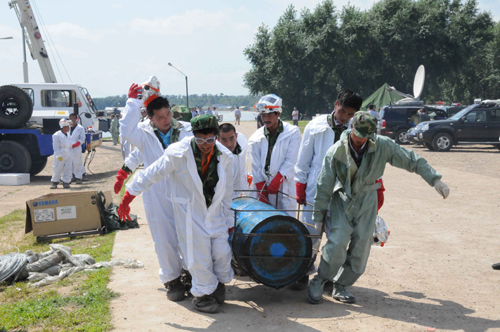Society
Water of Songhua River declared safe to drink
By Liu Mingtai, Chen Yan and He Na (China Daily)
Updated: 2010-07-30 07:10
 |
Large Medium Small |
CHANGCHUN - Workers on Thursday raced to retrieve some 3,000 chemical-filled barrels swept by floods into the Songhua River in Northeast China's Jilin province.
 Workers carry barrels of explosive chemicals to safety on Thursday in Yushu city, Jilin province. Some 7,000 barrels, including 3,000 containing chemicals, surfaced on the Songhua River after having been swept away in a recent flood. [Agencies]? |
Each barrel contained 170 kilograms of chemicals, officials said at a press conference on Thursday. Another 4,000 empty barrels also reportedly surfaced on the Songhua River.
But no chemicals had been detected in the river water, Ministry of Environmental Protection spokesman Tao Detian said on Thursday.
| ||||
By Thursday evening, more than 1,500 barrels had been recovered, and Jilin authorities said they had managed to retrieve all the barrels before they entered neighboring Heilongjiang province along the 1,900-km long Songhua River.
The National Meteorological Center said on Thursday that heavy rain would continue to pound central Jilin and southern Heilongjiang province, likely resulting in more floods, which might add difficulties to the recovery process.
Local police have banned individuals from retrieving, storing or opening these fallen barrels. So far, the recovered barrels have been properly placed in a branch factory of Jilin Petrochemical Company.
About 7,000 barrels tumbled into the Wende River on Wednesday and then floated into the Songhua River after floods broke storage facilities of two chemical factories - Jilin Xinyaqiang Biochem Co Ltd and Jilin Zhongxin Group - in Yongji county of Jilin city.
Thirteen people were confirmed dead and six were missing after floods swept through Yongji, officials said on Thursday.
Of the 3,000 chemical-filled barrels, about 2,500 barrels contained trimethyl chloro silicane - a colorless, flammable liquid - while 500 contained hexamethyl disilazane, a colorless liquid, officials said. Both chemicals had a pungent odor.
Once mixed with water, the two chemicals will transform to hydrochloric acid, ammonia and two other nontoxic chemicals.
The Songhua River is the major source of drinking water for some 4.3 million people along it, local officials said on Thursday.
Local environmental protection authorities, meanwhile, have set up seven monitoring sections along the river and are closely monitoring the water quality.
Water supplies in some parts of the city were cut after the incident, leading some local residents into hoarding bottled water on Wednesday.
"Now all five water supply plants of the city are running well, and the city has completely resumed water supply," said Liu Bo, director of the information office of Jilin city.
"However, affected by the floods, some of the families may have the conditions like lower water pressure", he added, "but it has no major effect."
Ren Shuzhen, a resident of the city who lives near the river, said the water supply of her home resumed on Wednesday evening, and the water looks normal.
"Since we've already bought three cases of bottled water yesterday, we plan to only use tap water for cooking and washing, and not drink it for a couple of days," she added.
Bottled water prices, which surged on Wednesday, returned to normal on Thursday. So far, the city has sufficient bottled water supplies and local commodity prices remain stable, local officials said.
Jilin's neighboring Heilongjiang province that lies to the lower reaches of the Songhua River has also worked out emergency plans to cope with the accident, such as setting up several defense lines to retrieve the barrels and monitor the water quality of the river around the clock.
The water supply to major ections of Harbin, the capital of Heilongjiang, come from Mopanshan reservoir, the other areas underground water, so the Songhua River case will not effect local people, said officials from Harbin Water Supply and Drainage Group.
But rumors that the Songhua River has been contaminated and that Harbin's water supply will be cut off prevailed - and with good reason. In 2005, millions of people in Heilongjiang were left without water for four days after an explosion at a benzene factory in Jilin city spilled the carcinogenic chemical into the Songhua River.
At RT-Mart supermarket, sales of bottled water increased by 30 to 40 percent on Thursday.
One local resident just wanted an answer. "I hope the government could tell us what had happened, since I'm eager to know whether our daily use water is safe or not," said Sun Miao, a resident of Harbin.


